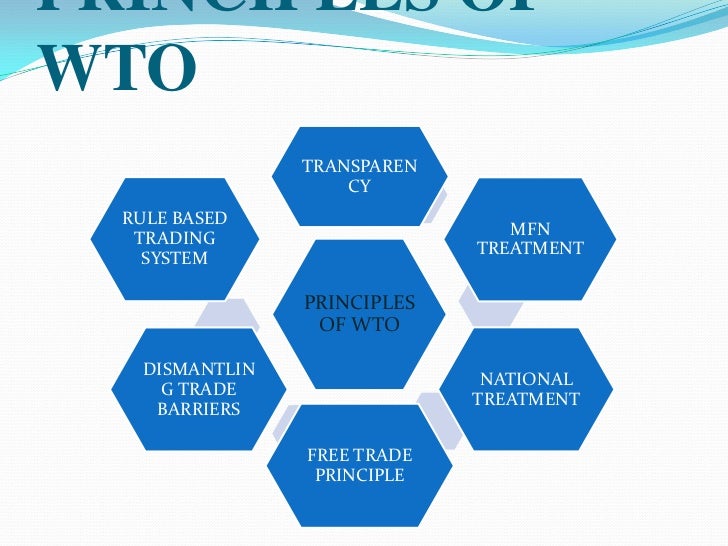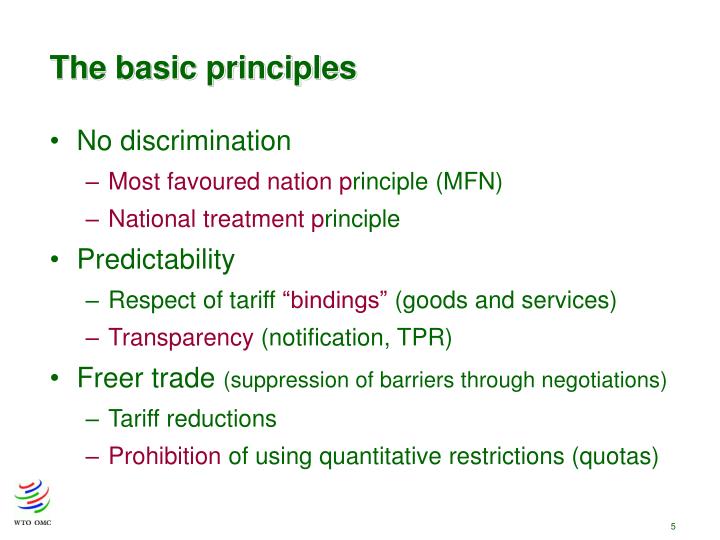Fundamental principles of wto trading system
WTO establishes a framework for national trade policies. Five core WTO principles are especially important to Afghanistan. Fundamentally, WTO is built on a foundation of non-discrimination which has two major components: The Most Favored Nation rule MFN has been a main feature of international trade policy for a long time. The Most Favored Nation rule prohibits discrimination between like products originating in, or destined, for different countries.

Once Afghanistan joins WTO, all other members must apply to Afghan exports the best treatment that they apply to the goods of any other WTO member country. This will be an advantage for Afghan exports. MFN treatment covers both discrimination de facto and de jure. It does not matter if a measure legally treats goods from all countries the same, if the goods from one country are in fact given treatment less favorable than goods from another country, discrimination applies. MFN covers all goods, bound or unbound see Principle 2 below.
A country cannot select which imports get MFN treatment. MFN treatment must be granted immediately and unconditionally. For instance, a country cannot tie MFN treatment to certain conditions, such as importing a specific amount, or following a specific environmental standard.
There are exceptions to MFN treatment. There are hundreds of bilateral and regional treaties which offer special treatment to the goods of neighboring countries or strategic partners.
Principles of Trading System
Afghan exports already receive preferential treatment from many countries because Afghanistan is considered a Least Developed Country. Preferential treatment is an exception to the MFN principle.

However, preferential treatment is granted at the discretion of the granting country, meaning that it can be removed from the special treatment anytime. By contrast, MFN treatment is guaranteed to all WTO member countries and cannot be removed. For this reason, joining WTO and getting MFN treatment for Afghan exports will be such an important advantage for Afghanistan.
National Treatment means that foreign imported goods, after they cross the border, should be treated no less favorably than domestically-produced goods. The underlying rationale behind national treatment is to ensure that tax and domestic regulation are not used to restrain trade. The national treatment obligation is found in Article III of GATT, It compels member states to avoid using taxes or regulations so as to afford protection to domestic production.
For instance, the government of Afghanistan cannot put a special tax on foreign cement in order to protect Afghan-produced cement. National treatment only applies after imported goods have crossed the border.
Foreign imports are obviously subject to tariffs at the border. Additionally, national treatment only applies to government measures. National companies like banks or manufacturers are free to give better treatment to special customers. Like Most Favored Nation MFN treatment, national treatment applies to all products, not just bound products.
Incentives for importing manufacturers to source their inputs locally or other domestic content rules are strictly forbidden. In practice, national treatment raises many issues for governments around the world. There are many legitimate regulatory measures a government would like to place on imports. For instance, these could relate to health or environmental protection. Article XX of GATT, allows a government to place restrictions on imports for listed reasons such as human, animal or plant life and health, protection of national treasures, protection of public morals or the conservation of natural resources.
These exceptions to national treatment cannot be disguised restrictions on trade. A similar type of constraint has to be applied to the locally-produced product as well or a WTO panel will ultimately consider it as a disguised restriction on trade. The WTO has not permitted countries to place even modest restrictions on imports for reasons not enumerated in Article XX. Therefore, taxes on foreign gasoline for environment protection goals, a ban on advertising foreign cigarettes, or a tax benefit for advertisers in local magazines to protect national culture, were all considered inconsistent with the WTO national treatment obligation.
Other than agreed during tariff negotiations, the Afghan government will not be able to put restrictions on imported goods in order to afford protection to domestic industry. Tariff commitments are made by WTO members during trade negotiations. These negotiations are bilateral one country to one country during the accession process, and then become multilateral all countries together after a country has joined WTO.

When a country accedes to the WTO, these commitments are listed in a schedule with ceiling bindings or maximum tariff rate. A country cannot exceed these bound rates without negotiating with its trading partners. It could mean compensating them for loss of trade. If satisfaction is not obtained, the complaining country may refer the matter to the WTO dispute settlement body.
Emissions trading - Wikipedia
WTO members are required to publish their trade regulations and to make sure any decisions affecting trade are notified to other WTO members and to the WTO Secretariat itself. The WTO also has a Trade Policy Review Mechanism TPRM which periodically reviews the laws and regulations of a WTO-member country. All WTO agreements are held together as a single undertaking. This means that member countries cannot selectively choose which agreement they will join.
The WTO, and all of its agreements, is a single package that member states must join on an all or nothing basis. In certain circumstances, governments are allowed to restrict trade. For instance, under the Agreement on Safeguards , a country is allowed to restrict temporarily products from which a surge in imports caused or is threatening to cause serious injury to a specific domestic industry.
Background on the Cairns Group and the WTO Doha Round - The Cairns Group
The WTO operates on a one country, one vote system, but actual votes are rarely taken. In fact, there are only limited cases where a vote could be taken. Decision making is by consensus. The advantage of consensus decision-making is that it encourages efforts to find the most widely acceptable decision, and member countries are more likely to abide by a rule they agreed to. The main disadvantages include large time requirements and many rounds of negotiation to develop a consensus decision, and the tendency for final agreements to use ambiguous language on contentious points that makes future interpretation of treaties difficult.
Enter Text To Search.
WTO | Understanding the WTO - principles of the trading system
Biography of His Excellency Mr. Jobs Procurement Assistant Financial Management Assistant. Expert — PromotingAccessto Finance for SMEs Consultant to Minister Office on Carpet Sector More. Tender Laboratory for Fuel and Liquefied Petroleum Gas Testing Equipment More. Announcement Laboratory for Fuel and Liquefied Petroleum Gas Testing Equipment Laboratory for Fuel and Liquefied Petroleum Gas Testing Equipment More.
Principles of the WTO Trading System World Trade Organization WTO. About MoCI The Minister Deputy Ministries MoCI Directorates MoCI Departments The WTO Member Facebook Twitter YouTube Google Plus Flickr SoundCloud.